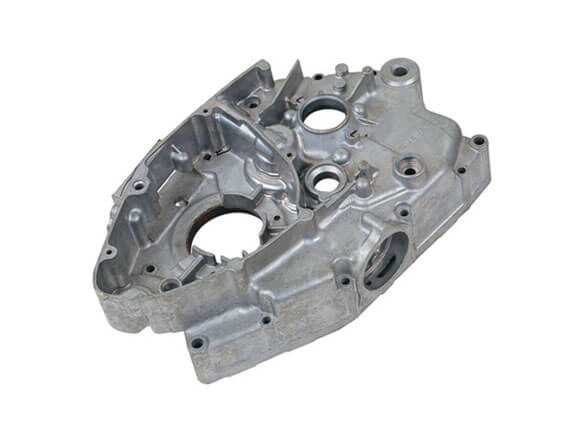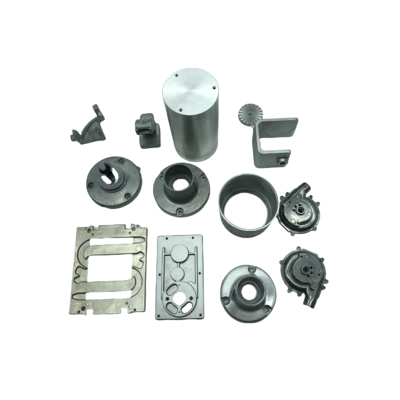Aluminum Foundry services that optimize your manufacturing output
The Future of Light Weight Aluminum Foundries: Advancements and fads Forming the Market
The aluminum foundry market is undergoing significant transformation. Secret trends highlight the relevance of sustainability and effectiveness. Developments in smart manufacturing and automation are becoming common. Foundries are progressively concentrated on making use of recycled materials. This change elevates concerns regarding future practices and technologies. Exactly how will these changes influence production approaches and market dynamics? The responses may redefine the sector landscape in unforeseen means.
Advancements in Smart Production Technologies
As the light weight aluminum foundry sector develops, developments in clever production technologies are coming to be increasingly crucial for enhancing performance and efficiency. The combination of automation, artificial knowledge, and the Internet of Points (IoT) is changing standard factory operations. These technologies make it possible for real-time monitoring of processes, enabling instant changes that enhance outcome and decrease waste.
Device knowing algorithms evaluate production information to identify patterns and predict upkeep demands, reducing downtime. Robotics are significantly employed for repetitive tasks, freeing proficient workers to concentrate on more intricate difficulties. In addition, electronic twins-- online designs of physical procedures-- promote simulations that can improve design and functional strategies.
The fostering of these wise manufacturing innovations is driving affordable advantages in the aluminum shop industry. By enhancing workflows and boosting decision-making capabilities, foundries can fulfill expanding market demands while maintaining high-quality criteria. The future of light weight aluminum foundries is indisputably linked to these technical innovations.
Welcoming Eco-Friendly Materials and Processes
The aluminum foundry sector is significantly focusing on environmentally friendly products and procedures to improve sustainability. This change consists of the adoption of lasting product sourcing, energy-efficient manufacturing strategies, and efficient recycling and waste monitoring methods. By incorporating these practices, foundries intend to decrease their ecological impact while preserving competitiveness in the market.
Sustainable Material Sourcing
How can aluminum foundries improve their sustainability efforts? Sustainable material sourcing has actually become an important strategy in achieving this objective. By prioritizing recycled light weight aluminum, factories can considerably reduce their environmental impact, as recycled materials require less energy and less resources compared to key aluminum manufacturing. Additionally, sourcing materials from accredited distributors who comply with eco-friendly techniques advertises responsible mining and lessens eco-friendly influence. Shops are likewise checking out different materials, such as biopolymers and environmentally friendly finishes, to match traditional aluminum procedures. Working together with stakeholders, including vendors and ecological companies, cultivates advancement in sourcing approaches. Eventually, welcoming lasting product sourcing not only aligns with international sustainability objectives however additionally positions aluminum foundries as leaders in ecologically liable manufacturing.
Energy-Efficient Manufacturing Methods
Light weight aluminum shops are progressively adopting energy-efficient manufacturing methods to complement their sustainable product sourcing campaigns. These methods concentrate on reducing power intake throughout the production procedure. Advanced innovations, such as induction melting and maximized casting procedures, are being implemented to reduce the general carbon footprint. In addition, automation and clever manufacturing systems improve operational effectiveness, allowing for far better energy monitoring. Shops are also discovering the integration of renewable power resources, such as solar and wind, to power their procedures. By focusing on power efficiency, light weight aluminum shops not only reduced production costs yet also straighten themselves with international sustainability objectives, making certain an extra environmentally responsible strategy to light weight aluminum production while meeting the climbing demand for environment-friendly practices in the market.
Reusing and Waste Monitoring
Welcoming environment-friendly products and processes, light weight aluminum shops are focusing on recycling and waste administration strategies to boost sustainability in their procedures. By integrating closed-loop systems, these centers are lessening waste and taking full advantage of resource performance. Scrap aluminum, an easily available material, is being recycled on-site, significantly reducing the demand for virgin products and decreasing power consumption. Technologies in sorting and refining modern technologies additionally facilitate the recycling of aluminum, guaranteeing that even contaminated products can be repurposed efficiently. Furthermore, foundries are taking on lasting methods such as minimizing contaminated materials and advertising the usage of naturally degradable products for packaging. This commitment to reusing not just lowers environmental influence however additionally enhances the economic feasibility of aluminum factories in an affordable market.
The Role of Automation and Robotics
Automation and robotics are increasingly changing the light weight aluminum factory industry, substantially enhancing production effectiveness. By integrating advanced innovations, factories can lower labor expenses while simultaneously enhancing safety standards for their labor force. This change not only enhances procedures however also positions the sector for lasting development in an affordable market.
Boosted Manufacturing Performance
Revolutionizing production procedures, the integration of innovative robotics and automation innovations has actually come to be a keystone for aluminum shops seeking enhanced effectiveness. These developments improve operations, minimize cycle times, and improve product high quality by lessening human error. Automated systems can keep an eye on production lines in real-time, enabling instant modifications that enhance outcome. Furthermore, robotics promote the handling of hazardous products, making sure more secure working settings while raising throughput. Anticipating upkeep innovations likewise add to performance by preparing for tools failures, therefore decreasing downtime. As a result, light weight aluminum factories can attain better consistency in their products while reacting a lot more swiftly to market demands. This welcome of automation is setting a new criterion for productivity and operational quality within the sector.

Lowering Labor Expenses
The shift in the direction of advanced robotics and automation in light weight aluminum shops not just enhances manufacturing efficiency however likewise plays a significant function in reducing labor costs. By incorporating automated systems, shops can decrease the reliance on hands-on labor, which commonly includes high salaries and training costs. Robotics improve repeated tasks such as putting, molding, and ending up, allowing for a higher result with fewer personnel. This technical modification not only reduces labor-related prices yet also improves uniformity and quality in production. Automation can run around the clock, maximizing operational hours without the associated prices of overtime or change differentials. As a result, light weight aluminum factories can accomplish significant savings while preserving affordable rates in an evolving market landscape.
Improving Safety Criteria
While typical aluminum shop procedures typically reveal workers to unsafe environments, the assimilation of robotics and automation significantly improves security standards within the market. Automated systems can execute risky tasks, such as molten steel handling and heavy lifting, lowering human direct exposure to hazardous conditions. Furthermore, robotics can run in poisonous ambiences and severe temperatures, effectively decreasing the danger of injury. Advanced checking modern technologies and expert system assurance real-time safety and security analyses, allowing for immediate feedbacks to possible hazards. In addition, automation simplifies process, decreasing the possibility of crashes created by human mistake. Because of this, the fostering of these technologies not only improves safety yet additionally fosters an extra effective and productive functioning setting in light weight aluminum factories.
Enhancing Power Efficiency in Manufacturing
As aluminum foundries look for to maintain competitiveness in an advancing market, improving power efficiency in manufacturing has become a crucial emphasis. By adopting sophisticated innovations such as high-efficiency melting heating systems and automated temperature controls, shops can notably reduce power intake. Carrying out real-time tracking systems permits exact monitoring of power usage throughout the manufacturing process, enabling quick adjustments to enhance effectiveness.
Furthermore, changing to different energy sources, consisting of eco-friendly alternatives, can additionally decrease the carbon impact. The combination of power healing systems, which redeem waste heat for reuse, is becoming increasingly usual. Educating employees in power management practices guarantees that every person associated with the production process is conscious of energy usage.
These campaigns not just reduced functional expenses but likewise line up with worldwide sustainability goals, positioning light weight aluminum factories as liable players in the industry while enhancing their overall competitiveness. - aluminum casting
Technologies in Recycling Aluminum
Innovations in recycling aluminum have actually acquired momentum alongside efforts to improve energy performance in production. The light weight aluminum industry has actually accepted innovative innovations that streamline the recycling procedure, minimizing energy intake and ecological impact. Techniques such as hydrometallurgy and brand-new sorting innovations enhance the extraction of aluminum from scrap, enhancing return rates and making sure better recycled product.
Furthermore, the development of closed-loop recycling systems allows shops to reuse light weight aluminum without considerable deterioration in top quality, making the process extra lasting. Innovations in logistics and collection, including improved radar and automated sorting, have additionally played a vital duty in boosting the performance of aluminum recuperation. These advancements not just add to a circular economic situation but additionally assist mitigate the carbon impact related to aluminum production. As the need for sustainable techniques expands, these advancements place the aluminum factory market as a leader in this contact form responsible source management.
Reacting To Market Needs and Consumer Trends
Versatility has actually become a keystone for aluminum foundries responding to progressing market needs and consumer patterns. As sectors significantly prioritize sustainability, light weight aluminum shops are shifting in the direction of environment-friendly methods, consisting of enhanced reusing procedures and lowered carbon footprints. This change aligns with consumer preferences for environmentally liable items, driving factories to innovate their offerings.
In addition, the increase of light-weight materials in aerospace and auto markets demands improvements in aluminum alloys and casting techniques. Foundries are buying research and growth to produce high-strength, light-weight elements that satisfy page rigid efficiency requirements.
Personalization has actually acquired grip, with consumers seeking customized solutions. Light weight aluminum foundries are leveraging sophisticated manufacturing innovations, such as 3D printing, to fit specific client demands efficiently. This responsiveness not just satisfies customer demands but likewise positions light weight aluminum shops competitively in a dynamic market landscape, guaranteeing their relevance in an ever-changing industrial environment.

Frequently Asked Concerns
Exactly How Do Aluminum Foundries Impact Local Economies?
Light weight aluminum factories substantially impact neighborhood economic situations by producing jobs, boosting need for regional providers, and contributing to neighborhood development. Their operations commonly cause increased tax obligation incomes, which can money essential public solutions and facilities enhancements.
What Are the Safety Regulations for Light Weight Aluminum Foundry Workers?
Security guidelines for aluminum shop employees include necessary personal safety devices, proper air flow systems, regular training on hazardous products, and adherence to guidelines set by work wellness and security administrations to decrease dangers and warranty worker security. - aluminum casting
Just How Does Aluminum Recycling Affect Global Supply Chains?
Light weight aluminum reusing significantly minimizes demand for raw products, improves resource effectiveness, and stabilizes prices. This change effects international supply chains by fostering a round economic climate, promoting sustainability, and making certain a much more resistant sector in rising and fall markets.
What Career Opportunities Exist in the Aluminum Shop Industry?
Various occupation chances exist in the aluminum shop industry, including functions in engineering, quality control, production administration, and r & d. Skilled labor settings such as mold and mildew makers and device operators are additionally in need.
How Do International Profession Policies Influence Light Weight Aluminum Foundries?
International trade policies substantially impact light weight aluminum shops by affecting import tariffs, supply chain dynamics, and market accessibility. These elements can affect operational costs, competitiveness, and total earnings within the international light weight aluminum production landscape.
By prioritizing recycled light weight aluminum, factories can substantially reduce their environmental impact, as recycled products need much less energy and fewer resources contrasted to key light weight aluminum manufacturing. Aluminum shops are significantly taking on energy-efficient production techniques to match their sustainable product sourcing efforts. Automation and robotics are progressively changing the light weight aluminum shop sector, considerably boosting production effectiveness. The change towards advanced robotics and automation in light weight aluminum factories not just enhances manufacturing effectiveness however also plays a considerable role in minimizing labor expenses. As aluminum factories seek to keep competitiveness in an advancing market, enhancing have a peek at these guys energy effectiveness in production has actually arised as a crucial emphasis.